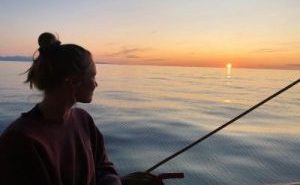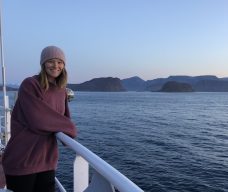By Brandi Thring
Polar microbiologist and researcher Madison Ellis (BSc ’18) is one of TRU’s seriously amazing alumni. She recently shared a snippet of her Arctic journey through TRU Alumni’s #seriouslyamazing social media campaign.
After receiving a Bachelor of Science in biology from TRU in 2018, Ellis continued her education at McGill University in pursuit of a Master of Science in polar microbiology. In 2019, Ellis had the opportunity to join an Amundsen Science Research expedition to conduct Arctic field work on oil spills.
We caught up with her to learn more.
That sounds like a seriously amazing experience. Can you tell us a little more about the expedition?
Yeah, it definitely was amazing. The expedition itself is an annual program which accommodates Arctic researchers onboard the Amundsen Canadian Coast Guard ship from approximately May to October. The expedition is split up into different legs and within those legs, you move to sites of interest for the groups onboard. The team I was with was on board for about 10 days, but our work window was a couple days.
The work itself was a lot of fun. We were revisiting a site from the 1980s where researchers had done an experimental oil spill with various treatments to accelerate the natural removal of the oil (the oil bioremediation). We first did an initial helicopter recon off the ship to survey the area, then we would de-board onto a smaller boat to jet into the area with our gear. We’d sample on the remote beaches using photos from published work to identify the same sites, and then go back onboard the ship to do some initial processing of the samples in these small labs fitted on the sides of the boat. Because of the tight timelines, it made for a couple of long, but rewarding days.
Top three highlights
1. The general remoteness of everything and all the amazing views.
2. Watching beautiful and brief sunsets over the water just after midnight.
3. Being on board the ship, it was super cool to network with broad disciplines all interested in different aspects of the Arctic and speaking French with the Coast Guard crew, who were mostly from Quebec.
Tell us about yourself. Were you always interested in sciences? Why did you choose TRU?
I was born and raised in Kamloops. I remember going to science camps at UCC when I was a kid, but I wouldn’t say I was exclusively interested in sciences. I chose TRU to play on the university soccer team and had initially enrolled in engineering. I ended up quitting soccer and engineering after completing my first year, took one semester off to go travelling and re-enrolled back at TRU in the science program in biology.
I noticed that while at TRU you participated in the Study Abroad program. Where did you go and how was the experience? Did studying abroad change your education/career goals?
I pursued studying abroad for two semesters in France. Studying abroad was absolutely one of my university highlights. Although I did French immersion, taking my courses in French and living life in French was really challenging. It took a few months to settle in, but then I really thrived. I travelled all over Europe, really honed my language skills and managed to pass all my courses. I did take a couple courses that I really enjoyed: genetics and molecular biology. They were both foundational courses for what I ended up pursuing, but I didn’t come back from studying abroad with much clarity about what I wanted to do. Overall, it was a very rewarding experience, and I did come back with a desire to keep pushing myself in new challenges.
Why did you decide to pursue polar microbiology? Was it part of your original plan or did something lead you to alter your course?
I was never very sure of what I wanted to do, and that wasn’t always the easiest as I was surrounded by what felt like a lot of people who knew exactly what they wanted to do. I was more trying to figure out what I was interested in. I tried doing undergraduate research in environmental microbiology, and the idea of doing a master’s degree came to me one day. It wasn’t something I had really considered; I didn’t know many people doing their master’s and so it felt like it opened a whole new world of possibility. Once I had the idea, I started to think about what would be interesting to research. I had learned about bacteria degrading oil compounds in second-year microbiology, and I was intrigued by the Arctic as being this remote area with a lot of global importance and so the two came together in my master’s quite perfectly. And it meant an adventure of moving across the country to Montreal, which I was all in for.
Tell us what you’re doing now. How did your education at TRU guide you to where you are today?
I now work happily as an integrated planning biologist with the Fish and Fish Habitat Protection Program with the Federal Department of Fisheries and Oceans. It’s a mouthful. My education at TRU allowed me to engage with different disciplines, get support and advice from professors and try various experiences from playing soccer, to studying abroad, to doing undergraduate research and more. And I think that experience at TRU has allowed me to be adaptable in different environments.
What advice would you give to current students with similar educational and/or career aspirations?
My personal path doesn’t feel like it was totally linear, and so my advice to current students would be to try different things, even if they seem unrelated, and it’s okay if you don’t have a clear vision of what you want to do.

